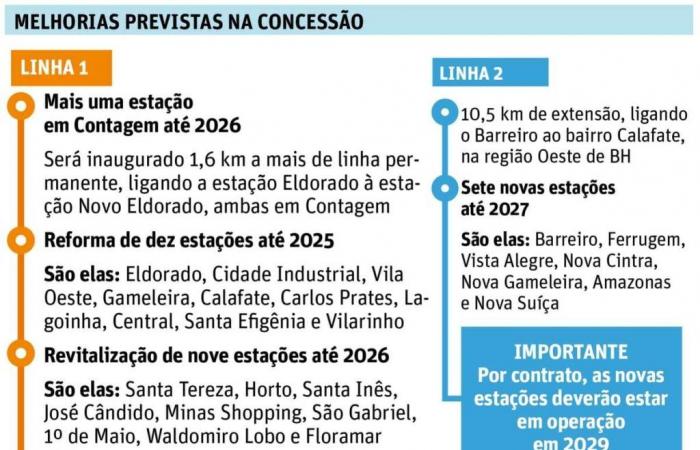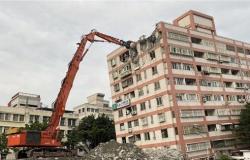Metrô BH, formed by Grupo Comporte Participações, took over the Belo Horizonte modal a year ago, with the challenge of improving the quality of service and, consequently, containing the drop in users, which has been occurring year after year. From 2013 to 2022, the annual number of passengers transported fell by 72% – from 64.9 million to 18.1 million, according to public management reports from the Companhia Brasileira de Trens Urbanos (CBTU), responsible for administering the system until that year – data for 2023 was not reported by the concessionaire.
Among the factors that explain the drop, the CBTU pointed out in the 2016 document that the situation was a reflection of the “economic crisis the country is going through, with a large number of unemployed citizens, and the predatory competition of the BRT in Belo Horizonte, leading to a loss of around 3.3 million passengers on that system”. The BRT (Bus Rapid Transit, which can be translated as “fast bus transport”, called “Move” in BH) was opened in 2015.
For Mauro Zilbovicius, professor at the Department of Production Engineering at the Polytechnic School (Poli) of USP and coordinator of the Laboratory of Integrated Strategies for the Mobility Industry (MobiLab), a factor that strongly influenced the drop was the increase in the fare value, which it went from R$1.80 in 2019 to R$5.30 in July 2023, which makes it the third most expensive in the country, behind São Paulo and Brasília.
“The tariff is a demand regulator. The higher fare means losing passengers, because the population has low income, and this is not just in Brazil,” he said. According to him, the operation of the Paris metro, for example, is paid for by the sum of what is collected from user fees, in addition to the contribution from the French Treasury (public money), and a contribution from commerce, which is considered a large system user.
Therefore, professor of urbanism Roberto Rolim Andrés, from the UFMG School of Architecture, defends a subsidy so that the tariff decreases in BH. “You only recover these users with public subsidies to reduce the tariff. This, unfortunately, is not within the perspective of the current management of the metro”, he assesses.
When contacted, Metrô BH did not comment on the drop in users and whether there is a plan to reduce the fare. The government of Minas Gerais and the Ministry of Cities had also not responded about the subsidy at the time of writing.
Delays and lack of dialogue
O Super rode the subway to observe the service and listen to users. In general, passengers who live and work in a region served by Line 1 like the mode, compared to the bus, due to the agility and greater predictability that this type of transport offers. But two complaints were repeated: the lack of punctuality of trips and the lack of communication between the subway and users.
“Today, I arrived late for my job because the train was 15 minutes late. This has happened two or three times a week, since privatization”, said intern Guilherme Augusto Gomes, 19 years old, resident of the Camargos neighborhood, in the Northwest region of BH. He also complained about the closure of one of the two stairs at Eldorado station, which makes disembarking take about 5 minutes.
“For me, it got worse. Expensive ticket, crowded, no air conditioning. And late. Before, there wasn’t so much of a problem with delays. They blame it on ‘lightning that struck’, but it’s not even raining,” said successful analyst Dainara Gomes, 31, who takes the bus from Vila Oeste to the center of the capital.
Professor Marinez Bressan da Costa, 56 years old, also says she has noticed an increase in delays. “I take the subway every day at 5:20 am. Today it was 5:45 am, already crowded. I took a photo and sent it to them (Metrô BH) via WhatsApp (31 3250-3901), asking ‘where’s the metro?’, but they didn’t answer me. In this first year, I saw no improvement in the service”, she says. On the day of the problem reported by Maria Inês, the company had not responded to her until 6:32 pm.
Company informs that it has already made improvements
Metrô BH reported that, since March 2023, when it took over the concession, the system has operated more efficiently. “The gradual improvements reflect the company’s commitment to providing regularity, punctuality and comfort to the user”, he declared, in a note.
Among the actions, the company cites the reduction of train “evacuations” – when all passengers have to get off because of some breakdown – from an average of 30 to one per month. “The average travel time between Vilarinho and Eldorado stations was reduced from 55 to 47 minutes. The average number of delayed trips decreased from around 35 to three per month”, he claims.
100 thousand people use the BH subway daily
“The ticket price is a little high. And the line is sometimes late. And it makes us late at work. Every minute, we end up at a loss.”
Ronderson de Amorim, 47 years old, administrative assistant, resident of Barreiro
“It says there will be improvement, but so far nothing. There had to be more hours. We, tired, in our sixties, have to stand, and the younger ones sit.” Marinalva Chaves, 60 years old, domestic worker, resident of Contagem
—
THE TIME reinforces the commitment to quality, professional and Minas Gerais journalism. Our newsroom produces responsible information every day that you can trust.
Follow THE TIME on Facebook, on Twitter and on Instagram. Help grow our community.
Tags: Metro number passengers fell decade
--





